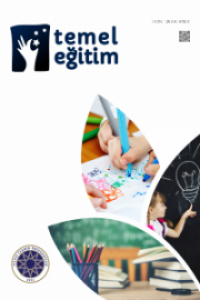Uzaktan Eğitim Yoluyla Yapılan Hayat Bilgisi Dersine Yönelik Öğretmen Görüşlerinin İncelenmesi
Öz
Tüm dünyayı etkisi altına alan COVİD-19 pandemisi toplumları tüm alanlarda etkisi altına almıştır. Pandemi sürecinde diğer alanlarda olduğu gibi eğitim alanında da bazı önlemler alınması zorunluluk haline gelmiştir. Bulaş riskinin azaltılması amacıyla yüz yüze eğitime ara verilerek uzaktan eğitime geçilmiştir. COVİD-19 pandemisi döneminde uzaktan eğitim yoluyla verilen Hayat Bilgisi derslerine yönelik öğretmen görüşlerini incelemeyi amaçlayan bu araştırma nitel araştırma yöntemlerinden olgubilim desende planlanmıştır. Araştırma verilerini toplamak amacıyla görüşme soruları geliştirilmiştir. Elde edilen bu verilerin analizinde içerik analizi tekniği kullanılmıştır. Bulgulara göre uzaktan eğitim platformlarına erişimde yaşanan sorunların başında teknolojik donanım yetersizliği gelmektedir. Uzaktan eğitim yolu ile işlenen Hayat Bilgisi dersinde yaparak yaşayarak öğrenmenin gerçekleşmemesi büyük bir eksiklik olarak görülmüştür. Buna ek olarak öğrencilerin yeterince söz hakkı alamadığı, uzaktan eğitim yoluyla yapılan derslerde sunum ve video gibi dijital ders içeriklerinin paylaşımının daha kolay olduğu, somut aktivite yapılamadığı, uygulamalı etkinliklerin öğrenci için yetersiz kaldığı ve öğretmenlerin çoğunun uzaktan eğitim platformu kullanım bilgisine bağlı olarak kendilerini uzaktan eğitim konusundan yeterli hissettikleri anlaşılmıştır.
Anahtar Kelimeler
Kaynakça
- Adıgüzel, A. (2020). Salgın Sürecinde Uzaktan Eğitim Ve Öğrenci Başarısını Değerlendirmeye İlişkin Öğretmen Görüşleri. Milli Eğitim Dergisi, 49(1), 253-271.
- Akdemir, O. (2011). Yükseköğretimimizde Uzaktan Eğitim. Yükseköğretim Ve Bilim Dergisi, 1(2), 69-71.
- Arslan, Y., & Şumuer, E. (2020). Covıd-19 Döneminde Sanal Sınıflarda Öğretmenlerin Karşılaştıkları Sınıf Yönetimi Sorunları. Milli Eğitim Dergisi, 49(1), 201-230.
- Aykaç, N. (2011). Hayat Bilgisi Dersi Öğretim Programında Kullanılan Yöntem Ve Tekniklerin Öğretmen Görüşlerine Göre Değerlendirilmesi Sinop İli Örneği. Kastamonu Eğitim Dergisi, 19(1), 113-126.
- Bates, A. W., & Bates, T. (2005). Technology, E-Learning And Distance Education. Psychology Press.
- Bektaş, M. (2007). Hayat Bilgisi Dersinde Ailelerin Çoklu Zekâ Kuramı Hakkında Bilgilendirilme Biçimlerinin Öğrencilerin Proje Başarıları Ve Tutumlarına Etkisi. Değerler Eğitimi Dergisi, 5(14), 9-28.
- Budak, F., & Korkmaz, Ş. (2020). Covıd-19 Pandemi Sürecine Yönelik Genel Bir Değerlendirme: Türkiye Örneği. Sosyal Araştırmalar Ve Yönetim Dergisi, (1), 62-79.
- Büyüköztürk, Ş., Çakmak, E. K., Akgün, Ö. E., Karadeniz, Ş. Ve Demirel, F. Bilimsel Araştırma Yöntemleri. Ankara: Pegem Akademi, 2014.
- Demir, F., & Özdaş, F. (2020). Covid-19 Sürecindeki Uzaktan Eğitime İlişkin Öğretmen Görüşlerinin İncelenmesi. Milli Eğitim Dergisi, 49(1), 273-292.
- Doğan, S., & Koçak, E., (2020). Eba Sistemi Bağlamında Uzaktan Eğitim Faaliyetleri Üzerine Bir İnceleme. Journal Of Economics And Social Research , 7(14), 111-124.
- Güneş, T., & Demir, S. (2007). İlköğretim Müfredatındaki Hayat Bilgisi Derslerinin, Öğrencileri Fen Öğrenmeye Hazırlamadaki Etkileri. Hacettepe Üniversitesi Eğitim Fakültesi Dergisi, 33(33), 169-180.
- Kılıç, Z. (2010). İlköğretimde Hayat Bilgisi Dersinde Aile Katılımı Çalışmaları (Master's Thesis, Anadolu Üniversitesi).
- Özdoğan, A. Ç., & Berkant, H. G. (2020). Covıd-19 Pandemi Dönemindeki Uzaktan Eğitime İlişkin Paydaş Görüşlerinin İncelenmesi. Milli Eğitim Dergisi, 49(1), 13-43.
- Özgül, E., Ceran, D., & Yıldız, D. (2020). Uzaktan Eğitimle Yapılan Türkçe Dersinin Öğretmen Görüşlerine Göre Değerlendirilmesi. Milli Eğitim Dergisi, 49(1), 395-412.
- Özyürek, A., Begde, Z., Yavuz, N. F., & Özkan, İ. (2016). Uzaktan Eğitim Uygulamasının Öğrenci Bakış Açısına Göre Değerlendirilmesi. Karabük Üniversitesi Sosyal Bilimler Enstitüsü Dergisi, 6(2), 595-605.
- Sarı, T., & Nayır, F. (2020). Pandemi Dönemi Eğitim: Sorunlar Ve Fırsatlar. Electronic Turkish Studies, 15(4).
- Süral, İ., & Girmen, P. (2019). Hayat Bilgisi Dersinde Dijital Bir Değerlendirme. Eskişehir Osmangazi Üniversitesi Sosyal Bilimler Dergisi, 20, 289-304.
- Tuncer, Ö. (2009). İlköğretim 3. Sınıf Hayat Bilgisi Öğretim Programının Öğretmen Görüşlerine Göre Değerlendirilmesi (Master's Thesis, Adnan Menderes Üniversitesi, Sosyal Bilimler Enstitüsü).
- Ünal, M., & Bulunuz, N. (2020). Covıd-19 Salgını Dönemi Uzaktan Eğitim Çalışmaları Ve Sonraki Süreçle İlgili Fen Bilimleri Öğretmenlerinin Görüş Ve Önerileri. Milli Eğitim Dergisi, 49(1), 343-369
Investigation of Teachers' Views on Life Studies Lesson Through Distance Education
Öz
The COVID-19 pandemic, which has affected the whole world, has affected societies in all areas. One of the social areas affected by this pandemic process is education. During the pandemic process, it has become a necessity to take some precautions in the field of education as in other fields. With the emergence of the COVID-19 epidemic, distance education was initiated by interrupting school education in order to reduce the risk of transmission. The application of distance education is seen as a solution to the problem experienced due to the closure of schools due to the epidemic. This study, which aims to examine teachers' views on the Life Studies lessons given through distance education during the COVID-19 pandemic period, was planned in the phenomenology pattern, one of the qualitative research methods. Interview questions were developed by the researchers to collect research data. The research data were obtained by using the created interview questions and content analysis technique was used in the analysis of these data. According to the findings obtained, the lack of technological equipment is the leading problem in accessing distance education. The failure to learn by doing and living in the Life studies lesson, which is taught through distance education, was seen as a major deficiency. In addition, students do not have enough right to speak, it is easier to share digital course content such as presentations and videos in distance education courses, concrete activities are not available, practical activities are inadequate for the student, and most of the teachers have a good knowledge of using distance education platforms, they feel themselves competent in distance education.
Anahtar Kelimeler
Kaynakça
- Adıgüzel, A. (2020). Salgın Sürecinde Uzaktan Eğitim Ve Öğrenci Başarısını Değerlendirmeye İlişkin Öğretmen Görüşleri. Milli Eğitim Dergisi, 49(1), 253-271.
- Akdemir, O. (2011). Yükseköğretimimizde Uzaktan Eğitim. Yükseköğretim Ve Bilim Dergisi, 1(2), 69-71.
- Arslan, Y., & Şumuer, E. (2020). Covıd-19 Döneminde Sanal Sınıflarda Öğretmenlerin Karşılaştıkları Sınıf Yönetimi Sorunları. Milli Eğitim Dergisi, 49(1), 201-230.
- Aykaç, N. (2011). Hayat Bilgisi Dersi Öğretim Programında Kullanılan Yöntem Ve Tekniklerin Öğretmen Görüşlerine Göre Değerlendirilmesi Sinop İli Örneği. Kastamonu Eğitim Dergisi, 19(1), 113-126.
- Bates, A. W., & Bates, T. (2005). Technology, E-Learning And Distance Education. Psychology Press.
- Bektaş, M. (2007). Hayat Bilgisi Dersinde Ailelerin Çoklu Zekâ Kuramı Hakkında Bilgilendirilme Biçimlerinin Öğrencilerin Proje Başarıları Ve Tutumlarına Etkisi. Değerler Eğitimi Dergisi, 5(14), 9-28.
- Budak, F., & Korkmaz, Ş. (2020). Covıd-19 Pandemi Sürecine Yönelik Genel Bir Değerlendirme: Türkiye Örneği. Sosyal Araştırmalar Ve Yönetim Dergisi, (1), 62-79.
- Büyüköztürk, Ş., Çakmak, E. K., Akgün, Ö. E., Karadeniz, Ş. Ve Demirel, F. Bilimsel Araştırma Yöntemleri. Ankara: Pegem Akademi, 2014.
- Demir, F., & Özdaş, F. (2020). Covid-19 Sürecindeki Uzaktan Eğitime İlişkin Öğretmen Görüşlerinin İncelenmesi. Milli Eğitim Dergisi, 49(1), 273-292.
- Doğan, S., & Koçak, E., (2020). Eba Sistemi Bağlamında Uzaktan Eğitim Faaliyetleri Üzerine Bir İnceleme. Journal Of Economics And Social Research , 7(14), 111-124.
- Güneş, T., & Demir, S. (2007). İlköğretim Müfredatındaki Hayat Bilgisi Derslerinin, Öğrencileri Fen Öğrenmeye Hazırlamadaki Etkileri. Hacettepe Üniversitesi Eğitim Fakültesi Dergisi, 33(33), 169-180.
- Kılıç, Z. (2010). İlköğretimde Hayat Bilgisi Dersinde Aile Katılımı Çalışmaları (Master's Thesis, Anadolu Üniversitesi).
- Özdoğan, A. Ç., & Berkant, H. G. (2020). Covıd-19 Pandemi Dönemindeki Uzaktan Eğitime İlişkin Paydaş Görüşlerinin İncelenmesi. Milli Eğitim Dergisi, 49(1), 13-43.
- Özgül, E., Ceran, D., & Yıldız, D. (2020). Uzaktan Eğitimle Yapılan Türkçe Dersinin Öğretmen Görüşlerine Göre Değerlendirilmesi. Milli Eğitim Dergisi, 49(1), 395-412.
- Özyürek, A., Begde, Z., Yavuz, N. F., & Özkan, İ. (2016). Uzaktan Eğitim Uygulamasının Öğrenci Bakış Açısına Göre Değerlendirilmesi. Karabük Üniversitesi Sosyal Bilimler Enstitüsü Dergisi, 6(2), 595-605.
- Sarı, T., & Nayır, F. (2020). Pandemi Dönemi Eğitim: Sorunlar Ve Fırsatlar. Electronic Turkish Studies, 15(4).
- Süral, İ., & Girmen, P. (2019). Hayat Bilgisi Dersinde Dijital Bir Değerlendirme. Eskişehir Osmangazi Üniversitesi Sosyal Bilimler Dergisi, 20, 289-304.
- Tuncer, Ö. (2009). İlköğretim 3. Sınıf Hayat Bilgisi Öğretim Programının Öğretmen Görüşlerine Göre Değerlendirilmesi (Master's Thesis, Adnan Menderes Üniversitesi, Sosyal Bilimler Enstitüsü).
- Ünal, M., & Bulunuz, N. (2020). Covıd-19 Salgını Dönemi Uzaktan Eğitim Çalışmaları Ve Sonraki Süreçle İlgili Fen Bilimleri Öğretmenlerinin Görüş Ve Önerileri. Milli Eğitim Dergisi, 49(1), 343-369
Ayrıntılar
| Birincil Dil | Türkçe |
|---|---|
| Konular | Eğitim Üzerine Çalışmalar |
| Bölüm | Araştırma Makaleleri |
| Yazarlar | |
| Yayımlanma Tarihi | 15 Ekim 2021 |
| Gönderilme Tarihi | 17 Haziran 2021 |
| Yayımlandığı Sayı | Yıl 2021 Sayı: 12 |



 No APCs or Submission Charges
No APCs or Submission Charges